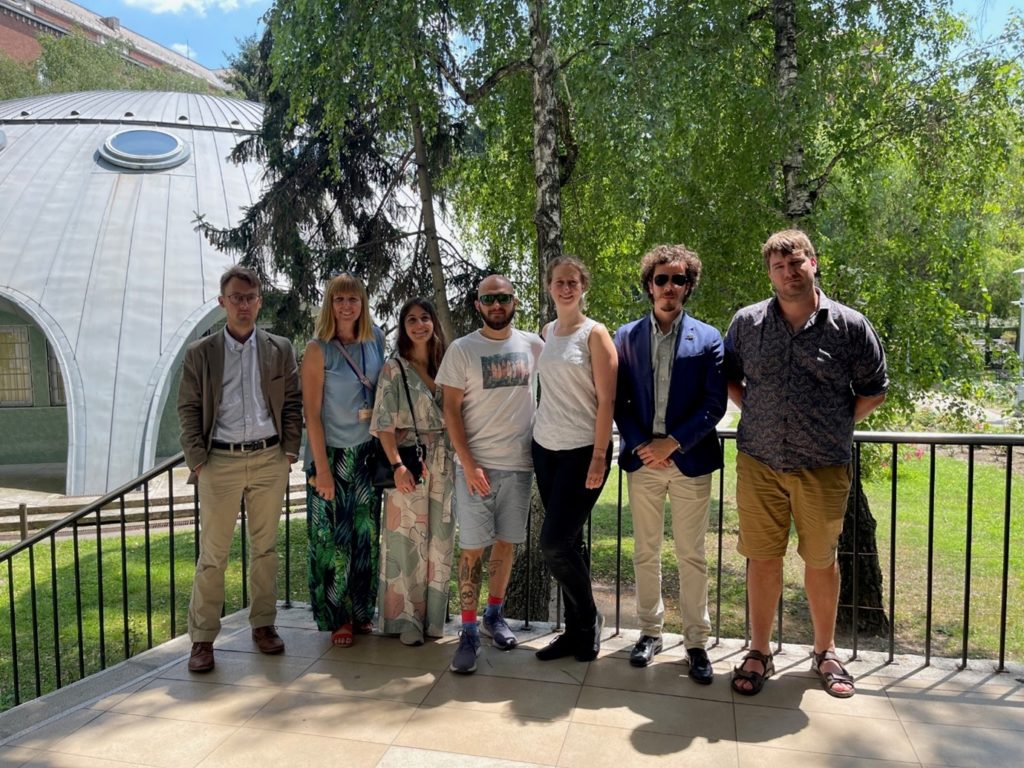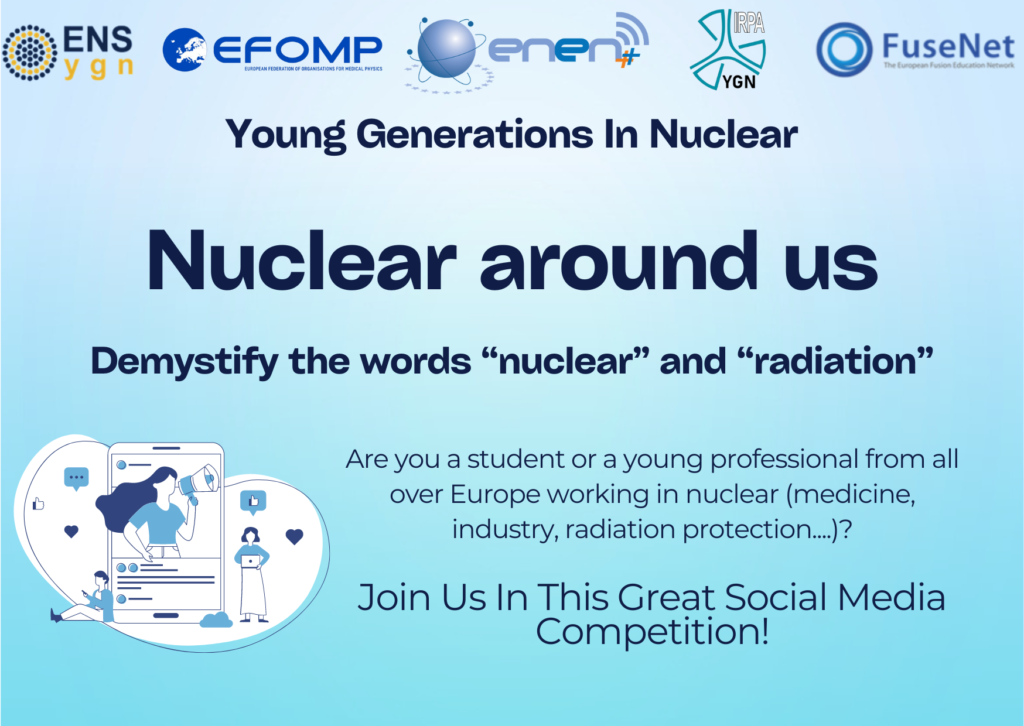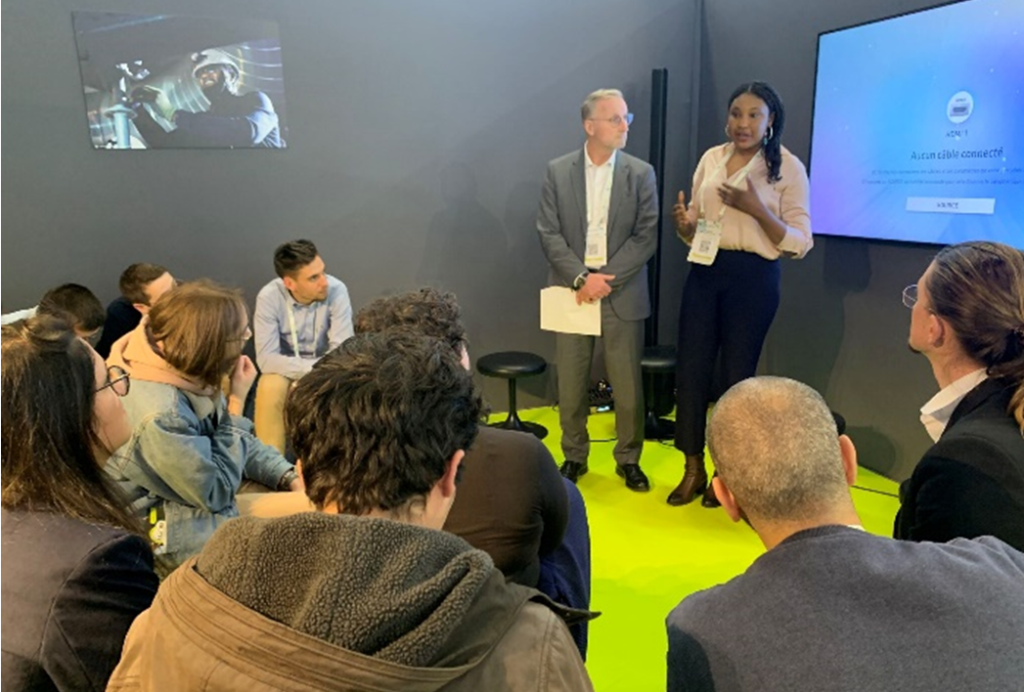Calls, Projects and Cooperation – Updates on ENS YGN Activities
Last year, as part of the ENEN2plus work package WP3, Task 3.4, a new cross-sectional cooperation was established under the leadership of the European Nuclear Society (ENS) between various young sections of different nuclear and radiation-related organisations. After several months of virtual brainstorming, the collaboration, consisting of the young sections of EFOMP (European Federation of Organisations for Medical Purposes), IRPA (International Radiation Protection Association), FuseNet (The European Fusion Education Network) and ENS (European Nuclear Society), met in person for the first time in July, parallel to the ENEN2Plus Summer School at the Budapest University of Technology and Economics.

Participants of the first in-person cross-sectional collaboration meeting (left to right): Sylvain Andresz (IRPA, replaced by Joel Piechotka), Emilia Janisz (ENS, replaced by Mattia Baldoni), Leticia Irazola (EFOMP), Jan Čečrdle (FUSENET), Andrea Kozlowski, Paco Suarez (both ENS), and Jakob Luyten (SCK CEN – ENEN representative).
During the summer school in Budapest, the young representatives of the EFOMP, IRPA, FuseNet and ENS sections gave a short presentation about their experiences and careers in their fields and talked about their everyday work, different backgrounds and motivations for their careers. In particular, common preconceptions about ‘nuclear’ were addressed and the students were encouraged to consider a career in STEM, especially in nuclear sciences and engineering. In addition to talking to the students, the representatives were also able to exchange ideas with the teachers who had travelled with them and encourage them to take part in other extracurricular activities.

The cooperation then came together to brainstorm intensively about possible projects such as meetings, sponsorships, working groups, etc. In addition to the goal of organising workshops at conferences, the first project to be realised is a social media competition. This competition “Nuclear around us” calls for the terms ‘nuclear’ and ‘radiation’ to be demystified by asking people up to the age of 35 to write an (unpublished) social media post and send the submission to the working group by email. A jury made up of members of the individual young sections will then select the ten best contributions to go through to the next round. There, the selected ideas will be published by all members of the collaboration in their social networks and released for public voting.
The winner will have their entry published on all the young sections’ social media platforms and receive a travel and participation grant to the European Research Reactor Conference (RRFM) in Warsaw, Poland, from 21 to 24 April 2024. If eligible (Master or PhD student), the winner get fast-track participation in the RRFM 2024 Student Competition and continue the debate on his/her work during the Poster Session. The collaboration will also organise a workshop during the RRFM and is planning another workshop in September at the EFOMP medical physics congress, taking place in Munich, but both are still in the planning stage. The Competition launched on 15th December, and submissions will be closed on 31 January 2024.
Another recent highlight was the collaboration between GIFEN and ENS YGN for the WNE―World Nuclear Exhibition to enable the visibility of young professionals. This collaboration occurred in two different ways. In summer, we opened a call for jurors for the WNE Innovation Awards. Five motivated young people were elected to serve on the jury in five different categories: Operational excellence, Nuclear safety, Skills and knowledge management, Products and services, and Societal and sustainable responsibility. The young jurors worked together with experts to determine winners in each category, who were then honoured during the WNE.

Amaratou Salez from France representing ENS YGN at the WNE to a group of international students.
A further call was launched in autumn inviting young professionals to present their current work and career to the students present at the WNE. The “Connect to Nuclear” programme is designed to encourage students to attend the WNE and pursue a career in nuclear engineering. An overwhelming number of more than 70 applications were received by ENS YGN, five of which were selected from across Europe and supported with travel grants of 500€ to attend the WNE. The selected scholars came from a wide range of backgrounds, such as data scientists or quality management, to show the diversity of professions and careers in the nuclear sector. The travel grants consisted of 300€ from GIFEN and 200€ from ENS YGN. In addition to the opportunity to visit the WNE, gain an impression and expand their networks, the selected young professionals were also encouraged to share their message. Short messages from the scholarship holders can be found on our Linkedin page.

The next edition of Innovation for Nuclear―Europe (I4N Europe) is also coming up. I4N was launched in 2018 and is the IYNC’s international innovation competition. The aim of I4N is to reward innovative ideas from various fields such as engineering, economics or sociology that focus on nuclear technologies and/or applications and contribute to the United Nations Sustainable Development Goals. I4N Europe is the regional edition of I4N, alongside Africa and North America, whose winners will be forwarded to I4N at the IYNC. The competition raises visibility and innovation in the nuclear industry and drives change and improvement in the economy with youth-driven solutions. For the first European edition (2023), hosted by ENS YGN during the ENYGF in Krakow, four YGNs―Hungary, Spain, France and Poland―sent their national winners to present their ideas to an expert jury consisting of nuclear experts from Poland and the Chairperson of ENS YGN. The Spanish winners will continue their way to IYNC 2024.
During CCM#3 in Ljubljana, the Core Committee (the body of representatives of all European YGNs) decided to organise I4N Europe on an annual basis. In close contact with interested YGNs, ENS YGN has just opened the call for entries for the national innovation competition, which this year focuses in particular on the United Nations Sustainable Development Goals. Until the end of April, all national innovation events that have been finalised can submit their national winners to I4N Europe, which will take place in Sofia in early summer.
Finally, ENS YGN is happy to announce the growth in members, welcoming Estonia (Eesti Tuumanoored), Serbia, and Norway to the Core Committee.



